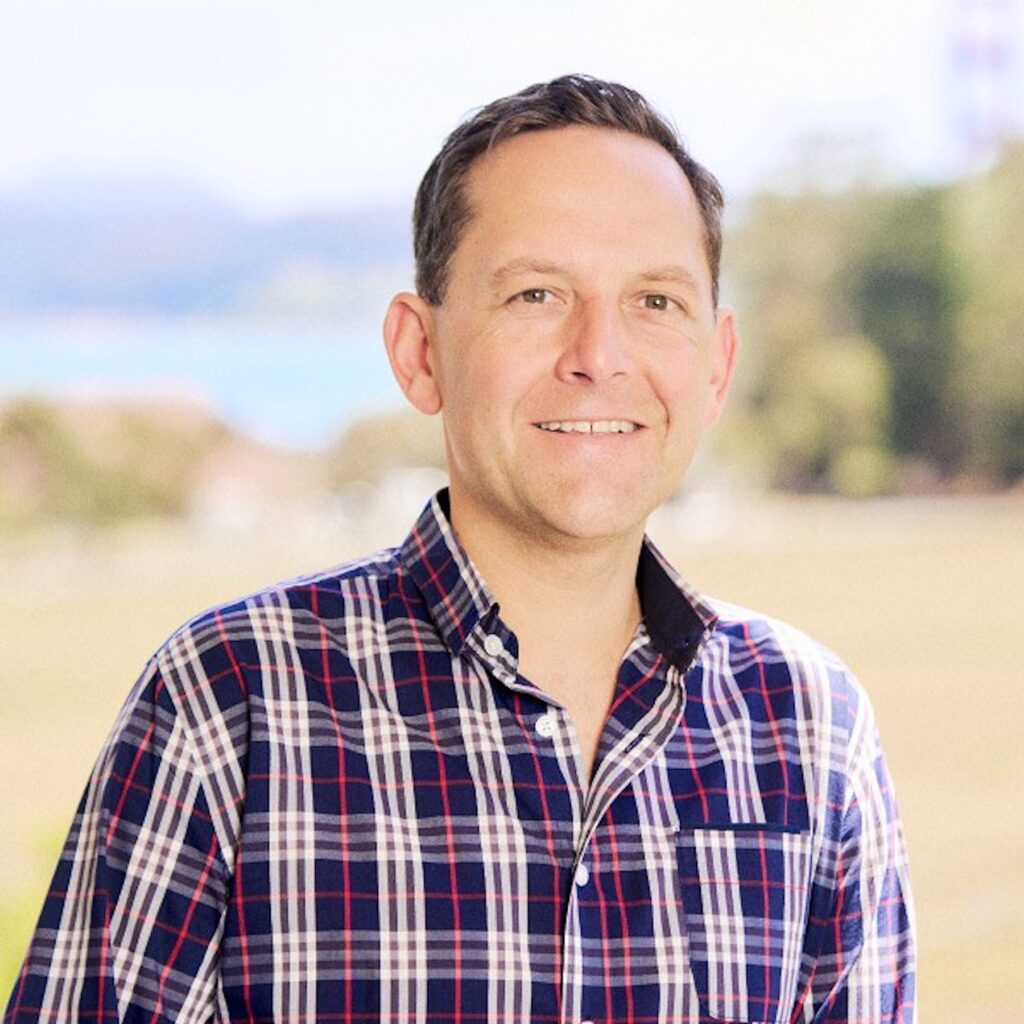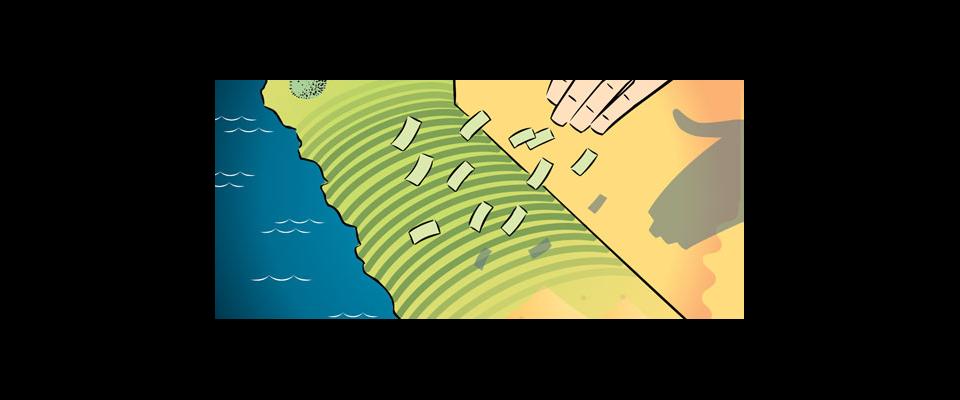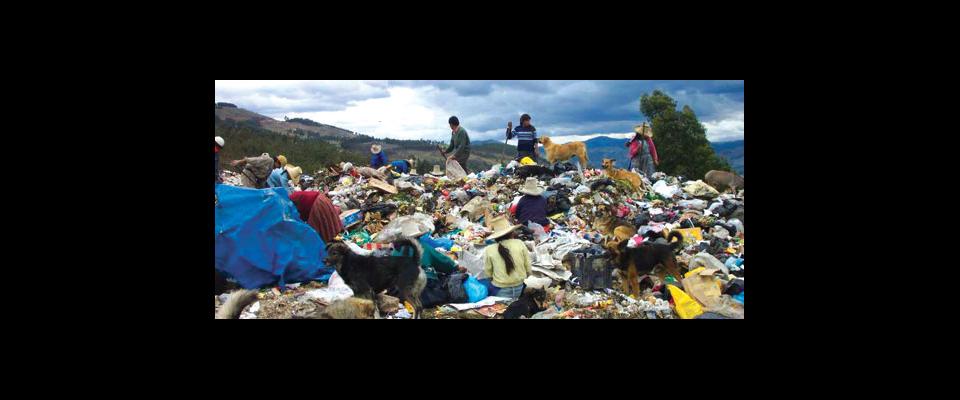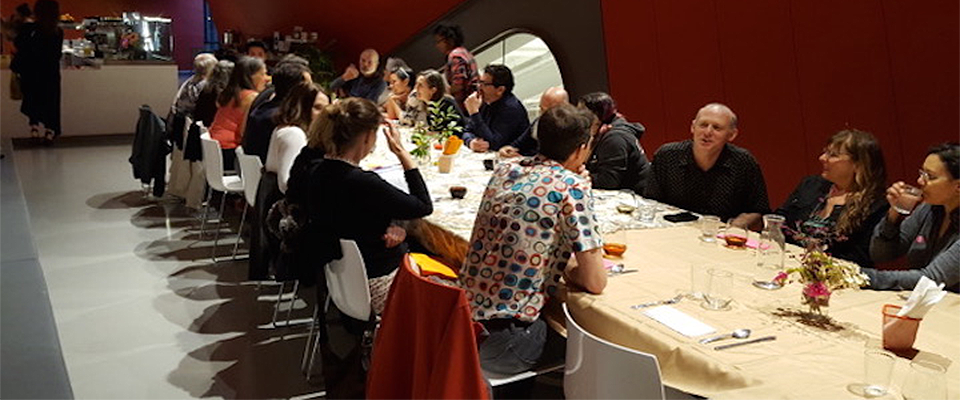What started as a way for a group of venture capital besties to convene during the COVID lockdown has become a podcast sensation. The first episode of All-In (March 2020) got more than 100,000 downloads and the show is now listed among the top 100 podcasts in the United States. There’s an international following as well; fans organize in-person meetups in cities around the world, including Auckland, Dubai, and New Delhi.
Tech, markets, politics, and poker are all regular fare for the four Bay Area VCs who host the show, including Cal alum David Friedberg ’01, billionaire CEO of The Production Board.
On the podcast, Friedberg is known for his end-of-show “science corners,” enthusiastic explanatory riffs on recent headlines, including everything from the first results of the James Webb Space Telescope to the idea of replacing animal protein in the human diet (he’s a lifelong vegetarian). Oh, and nuclear fusion. Friedberg declared the December announcement from Lawrence Livermore National Laboratory on achieving net energy gain in a fusion reaction to be the biggest science story of 2022.

“With unlimited free energy, we can terraform Earth. We can take ocean water and desalinate it, pump it into deserts and turn them into rainforests. All these concerns we have about climate change and carbon in the atmosphere, they all can be reversed with infinite energy,” he said in one of his freewheeling fusion commentaries from earlier last year, going on to speculate that the next century will be about using fusion to manufacture heavier rare earth elements, turning water into lithium, say, or even gold. In a tweet, Friedberg said such terrestrial nucleosynthesis could be “the greatest source of value and wealth creation in the 22nd century.”
Pause here to remember a few millennia of alchemists’ failed dreams or to consider recent headlines about crashing cryptocurrencies and Friedberg’s level of optimism may seem extreme, even by Silicon Valley standards. These are not, by and large, the most bullish of times. A 2022 survey of U.S. college students found them to be generally pessimistic on issues related to human progress, including poverty, political polarization, and climate change.
The latter has been a particular focus of Friedberg’s. An early Google exec, he went on to found the weather data and crop insurance firm Climate Corporation, which was acquired by Monsanto for more than $1 billion in 2013. Today he heads The Production Board, a VC firm that aims to do no less than reimagine Earth by investing in life sciences, food, agriculture, and energy.
For all his optimism, however, Friedberg’s hope in science-based progress is often accompanied by warnings about the precariousness of human systems. He has lately lamented runaway debt, at both the federal and individual level, and he frequently plugs Ray Dalio’s book Principles for Dealing with the Changing World Order, which predicts rising international conflict and an inevitable near-term collapse of American power relative to the rest of the world, particularly China.
In March, I got an hour with Friedberg via Google Meet to discuss his outlook on everything from the future of art to his time at Cal and how poker taught him to be an entrepreneur.
In February, I visited campus for a packed poetry reading by Nobel laureate Louise Glück at Morrison Library. On the way in, I noticed the statue of Mark Twain, which made me wonder: With all the ChatGPT stuff in the news, I’m wondering about books. In 200 years, will we be making statues of people who are masters at prompting large language models to spit out prose and going to listen to readings by chatbots? What will we share and celebrate when it comes to culture and story?
Today, many people have an aversion to the idea of AI creating personalized movies, games, and so on. It’s like, “Oh my god, we’re all going to have our different bubbles. It’s going to be so impersonal and we’re not going to have culture.”
I’ll just say I think there are many things we can’t even contemplate right now that will lead to an entirely different model for what culture is in the future. And it is possible to experience quite different storylines but still have some sort of common shared experience, beliefs, and truths.
Imagine a children’s story about a kid who lives in a school basement, only instead of being written down in a book, it’s in code which can be experienced dynamically, depending on the reader. You get the story from the perspective of the kid underground. I get it from the teacher who hears noises beneath the floor. Someone else gets the story as another student in the same school.
This is sort of the same way that in the ancient world, before the printing press, from The Epic of Gilgamesh to stories in the Bible to traveling bards, there were common archetypes told differently depending on the teller and the cultural context, often meant to impose a certain moral truth. I think AI will end up bringing us a world where we see there are really important shared truths not bound to a specific type of content.
Let’s talk about optimism. It’s there weekly when you talk about AI and most science or tech topics. But then, when I hear you talk about things like debt and global conflict, it sounds like the end for America. So which is it?
Both are and can be true. The British Empire collapsed but most everyone that lives in England now is much better off than their countrymen were back then. Today they have home heating, supermarkets, transportation, health care, the friggin’ internet, and iPhones. They live longer, GDP per capita is higher… there are so many measures that indicate significant progress.
Humans have always been under existential threat. Yes, there’s climate change today, but 200,000 years ago, protohumans were wandering the savannah, starving, on the brink of extinction multiple times over.
I have a pitch deck for investors where I point out that humans have always been under existential threat. Yes, there’s climate change today, but 200,000 years ago, protohumans were wandering the savannah, starving, on the brink of extinction multiple times over. Our survival depended on finding our next meal. Then we figured out we could engineer Earth and grow food. Agriculture was arguably one of the first technologies.
Our feeling of dread is how our brains are wired, and it has allowed us to solve problems and innovate in ways that would have been unfathomable even a generation or two before. Looking back, you not only see the resolution of existential threats but also subsequent eras of extraordinary abundance. Given the portfolio of technologies we humans are creating, especially in energy and bioengineering, I really do think there will be all sorts of new abundance by the back half of this century, including the ability to eradicate most diseases.
But there will always be broad cycles in human societies too. Periods of relative freedom bring about more progress, the cost of which is inequality. Then there’s an evolution to more socialist or autocratic systems to redistribute resources. Eventually, everyone feels constrained and there’s a push for more freedom. Right now, there’s massive pushback in the United States and around the world against inequality, and populism is on the rise everywhere, but it will cycle back. It’s all good.
It’s all good?!?
I mean, we’ve been doing this for millennia.
How did you wind up at Cal? I assume you had your pick of universities.
I got rejected everywhere I applied to college that required a recommendation. My behavior in high school wasn’t very good. I was a frustrated kid and had a bunch of social issues.
My parents were documentary filmmakers and we’d moved from South Africa to Los Angeles when I was 6. Most of my family, including my grandfather, moved to London. He paid for me to go to a private school, the Buckley School. Said if I was going to be all the way out in California, he wanted to make sure I got a good education. It was very posh and there were lots of Hollywood kids—Paris Hilton, Nicole Richie, Kim Kardashian, the Jackson kids… It was challenging to be a kid without much money in that kind of environment.
I gave all my money back and more to those guys. I had to call my mom once because I lost my boots and jacket in a game. I said, “Mom, it’s 30 below, can you please send me some money?”
I didn’t graduate high school. I didn’t have a ton of friends, felt challenged at home, and wanted to get out of there. When I was 15, I went to the Harvard summer school for high school students. I didn’t go to class very much when I was there, just drank a lot of Zima and smoked cigarettes and hung out on Harvard Yard, getting into trouble and messing around. It was freeing and a totally different universe for me.
I’d been accepted into a college program at Clarkson University in New York where they give you a full scholarship and allow you to skip your senior year of high school to start studying engineering. I called my parents and said, “Hey, I’m going to stay out here on the East Coast. I want to do this program.” They said okay and I took a Greyhound bus to Potsdam.
That year when I wasn’t in class, I took road trips to Ottawa and hung out with the locals around Clarkson. I made $4.25 an hour working at a pool hall where I met a bookie who would do his business from a payphone there. He had a home poker game and invited me to play. I gave all my money back and more to those guys. I had to call my mom once because I lost my boots and jacket in a game. I said, “Mom, it’s 30 below, can you please send me some money?”
It was pretty cold in New York and I’d decided I wanted to leave. I’d never visited Cal before checking myself into the dorms freshman year.
Talk about your time at Cal. Why did you major in astrophysics and did you intend to spend life as a physicist?
I was interested in physics and math and thought I’d double major. I’d already done a bunch of math courses and so I started doing upper-division math as a freshman and really didn’t like it. Physics was more interesting. My core interest was the cosmological large-scale structure of the universe. Then I took Astrophysics 10 with Alex Filippenko, which was fantastic. Years later, I ran into him at an event and we’ve since become really good friends.
While I was a student, I spent two-and-a-half years working at Lawrence Berkeley National Lab at a division called the Center for Beam Physics. I got to do some computer modeling of particle beam technology, also very basic stuff like building an educational website on beam physics for the marketing people to use.
Working at the lab was interesting but, for me, boring. These guys would work for years and years on some small piece of a bigger particle beam project that may or may not get funded to be built in 20 years. Some people loved the iteration, but I found it tedious and depressing.
The dot-com boom was happening and there was a 19-year-old in my freshman dorm who started a company selling CDs or DVDs online. He sold it to another startup for a million bucks. Between classes, I would buy a cheese sandwich and the Wall Street Journal—this was pre-iPhone—and go sit in Sproul Plaza. I was always a tech guy and it was amazing to see that computers and the internet were really changing the world and there was so much money to be made.
I never took any sort of business or accounting classes, but I spent a lot of time my junior and senior years writing a business plan for a company that I wanted to launch—a shopping comparison site for buying calling cards, called Telebomb.com. You know… the bomb. The name was idiotic. I spent hours in Moffitt Library on my computer researching all this stuff… how to build a profit and loss statement, how to build a financial forecast. Eventually, I had a business plan that was 60 pages long.
I went to a family friend and she said, “Yeah, I’ll give you some money.” I was thinking, “Yes, it’s working! I’m going to raise money. I’m building a startup.” Then the dot-com thing blew up.
Once I got a car, I started driving to the Oaks Card Club and San Pablo Lytton Casino to play poker. After what happened in New York, I bought some books and taught myself the statistics of the game. I always had other jobs at Cal, but I think I made $10 grand playing poker in tournaments and live games in my freshman year.
The statistics play out over the long run, and things in life similarly come in chunks… you’ll lose a lot of hands, then have a chunky win.
Anyway, when it came time to graduate, I realized I should probably get a real job and learn about business. Back then, investment banking was the amazing, exciting job to get. It seemed like I was the only astrophysics major applying. I added “poker player” to my résumé, which got me many interviews.
So did you learn more from physics or poker?
You always draw from experiences in different ways. In poker, I learned that as long as you make the right decisions, there will be a payoff over a long period of time. Actually experiencing that through hours, days, weeks, and years of play teaches how to get ready for entrepreneurialism. The statistics play out over the long run, and things in life similarly come in chunks… you’ll lose a lot of hands, then have a chunky win. By the way, that’s very similar to data we collect in astrophysics. We collect a lot… chunks of it are good, but most of it is bad. The chunky good stuff drives all the answers you’re looking for.
I worry about the long-term trend for higher education. Your astrophysics degree was significantly less expensive than it is for today’s students. Where are we headed in higher ed?
The biggest problem in higher education is government funding with no accountability. There’s no malicious intent per se, but there’s also no market pushback, no signal that says this isn’t affordable. It’s about incentives. The price continues to go up by a few percent and the same number of students apply. University administrations naturally say, “We can hire more people, we can spend more, we can build this new lab, we can charge a little more, we can always increase the budget a little bit.”
Most of the student loans are ultimately provided by the government. Students are 18 and don’t feel pressure about paying them back. They assume they’ll come out the other end and be able at some point to pay off their loan, which besides, is at low and even zero interest. No one is doing the analysis or insisting on accountability. The government isn’t saying to institutions, “You need to make sure that if you’re charging someone $250,000, they’re going to be able to pay it back because of the incremental value they get from your education.”
Now we’re in a quandary and the half-a-trillion dollars that the current federal administration is trying to forgive doesn’t solve the fundamental problem. Ultimately we will hit a wall, leading to significant destruction of education generally.
Imagine you’re talking to the U.C. Board of Regents. What do you say?
The right role for educational institutions in general, is to rethink how to go from a young age into the working world in a way that makes sense as automation and AI come to the fore in the marketplace.
Right now, among VCs and tech executives, the question is, “What the heck are we going to do with all these engineers?” One of the biggest applications of AI right now is writing software.
By the way, this is coming up today for all the knowledge workers who already have their degrees. Right now, among VCs and tech executives, the question is, “What the heck are we going to do with all these engineers?” One of the biggest applications of AI right now is writing software. Everything is up in the air. It’s not about math, science, or English, but how to engage people and use our humanity to add value in the era of AI.
How do you think about the rise of your public persona? Do you have some sort of goal or plan in all this?
I don’t know. It’s kind of weird and doesn’t really resonate, to be honest. Historically, I’ve always been very private. I didn’t tell people what I was working on and generally was just heads-down, making stuff.
To the degree I have any influence, I just want people to do the zoom-out. If I were ever to run my own podcast, it would be called The Wider Aperture. If we all do that, escape our often narrow views, and really feel from a different perspective, maybe we can accept things, and also start to think bigger about how we have progressed, how we treat each other, how we treat animals… then I would feel like whatever influence I’ve gained is useful. Otherwise, it doesn’t really do much.
Geoff Koch is a writer and poet in Portland, Oregon.





















